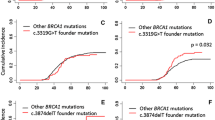Abstract
We studied the effects of BRCA2 and CHEK2 variants on breast cancer risk in two case-control series from Poland and Belarus. The missense BRCA2 variant T1915M was associated with a significant reduction in breast cancer risk (OR = 0.62; 95% CI 0.49–0.79; P = 0.0007). Modest increases of breast cancer risk were observed for the four analysed CHEK2 variants (I157T, 1100delC, IVS2 + 1G > A and del5395) (OR = 2.2; 95% 1.7–2.8; P = 0.0001). The highest risk was observed among women who carried both a BRCA2 and a CHEK2 variant (OR = 5.7; 95% CI 1.7–19; P = 0.006). We observed a statistically significant interaction effect between CHEK2 mutations and the BRCA2 substitution (P = 0.03). These data suggest that the BRCA2 T1915M polymorphism alone might be associated with a reduced risk of breast cancer, but among CHEK2 mutation carriers, it may lead to an unexpectedly high risk.
Similar content being viewed by others
Notes
Cybulski C, Huzarski T, Byrski T, Lubiński J. Estrogen Receptor Status in CHEK2-positive Breast Cancers: Implications for Chemoprevention (submitted for publication).
References
Narod SA, Foulkes WD (2004) BRCA1 and BRCA2: 1994 and beyond. Nat Rev Cancer 4:665–676. doi:10.1038/nrc1431
Meijers-Heijboer H, van den Ouweland A, Klijn J et al (2002) Low-penetrance susceptibility to breast cancer due to CHEK2(*)1100delC in noncarriers of BRCA1 or BRCA2 mutations. Nat Genet 31:55–59. doi:10.1038/ng879
CHEK2 Breast Cancer Case-Control Consortium (2004) CHEK2*1100delC and susceptibility to breast cancer: a collaborative analysis involving 10, 860 breast cancer cases and 9, 065 controls from 10 studies. Am J Hum Genet 74:1175–1182. doi:10.1086/421251
Zhang S, Phelan CM, Zhang P et al (2008) Frequency of the CHEK2 1100delC mutation among women with breast cancer: an international study. Cancer Res 68:2154–2157. doi:10.1158/0008-5472.CAN-07-5187
Johnson N, Fletcher O, Naceur-Lombardelli C, dos Santos Silva I, Ashworth A, Peto J (2005) Interaction between CHEK2*1100delC and other low-penetrance breast-cancer susceptibility genes: a familial study. Lancet 366:1554–1557. doi:10.1016/S0140-6736(05)67627-1
Oldenburg RA, Kroeze-Jansema K, Kraan J et al (2003) The CHEK2*1100delC variant acts as a breast cancer risk modifier in non-BRCA1/BRCA2 multiple-case families. Cancer Res 63:8153–8157
Cybulski C, Gliniewicz B, Sikorski A et al (2007) Epistatic relationship between the cancer susceptibility genes CHEK2 and p27. Cancer Epidemiol Biomarkers Prev 16:572–576. doi:10.1158/1055-9965.EPI-06-0566
Górski B, Narod SA, Lubiński J (2005) A common missense variant in BRCA2 predisposes to early onset breast cancer. Breast Cancer Res 7:R1023–R1027. doi:10.1186/bcr1338
Cybulski C, Wokołorczyk D, Huzarski T et al (2007) A deletion in CHEK2 of 5, 395 bp predisposes to breast cancer in Poland. Breast Cancer Res Treat 102:119–122. doi:10.1007/s10549-006-9320-y
Cybulski C, Górski B, Huzarski T et al (2004) CHEK2 is a multiorgan cancer susceptibility gene. Am J Hum Genet 75:1131–1135. doi:10.1086/426403
Górski B, Cybulski C, Huzarski T et al (2005) Breast cancer predisposing alleles in Poland. Breast Cancer Res Treat 92:19–24. doi:10.1007/s10549-005-1409-1
Healey CS, Dunning AM, Teare MD et al (2000) A common variant in BRCA2 is associated with both breast cancer risk and prenatal viability. Nat Genet 26:362–364. doi:10.1038/81691
Breast Cancer Association Consortium (2006) Commonly studied single-nucleotide polymorphisms and breast cancer: results from the Breast Cancer Association Consortium. J Natl Cancer Inst 98:1382–1396
Esashi F, Christ N, Gannon J et al (2005) CDK-dependent phosphorylation of BRCA2 as a regulatory mechanism for recombinational repair. Nature 434:598–604. doi:10.1038/nature03404
Tan Y, Raychaudhuri P, Costa RH (2007) CHK2 mediates stabilization of the FOXM1 transcription factor to stimulate expression of DNA repair genes. Mol Cell Biol 27:1007–1016. doi:10.1128/MCB.01068-06
Zhang J, Willers H, Feng Z et al (2004) CHK2 phosphorylation of BRCA1 regulates DNA double-strand break repair. Mol Cell Biol 24:708–718. doi:10.1128/MCB.24.2.708-718.2004
Thorslund T, Esashi F, West SC (2007) Interactions between human BRCA2 protein and the meiosis-specific recombinase DMC1. EMBO J 26:2915–2922. doi:10.1038/sj.emboj.7601739
Pharoah PD, Antoniou AC, Easton DF, Ponder BA (2008) Polygenes, risk prediction, and targeted prevention of breast cancer. N Engl J Med 358:2796–2803. doi:10.1056/NEJMsa0708739
Author information
Authors and Affiliations
Corresponding author
Rights and permissions
About this article
Cite this article
Serrano-Fernández, P., Dębniak, T., Górski, B. et al. Synergistic interaction of variants in CHEK2 and BRCA2 on breast cancer risk. Breast Cancer Res Treat 117, 161–165 (2009). https://doi.org/10.1007/s10549-008-0249-1
Received:
Accepted:
Published:
Issue Date:
DOI: https://doi.org/10.1007/s10549-008-0249-1




